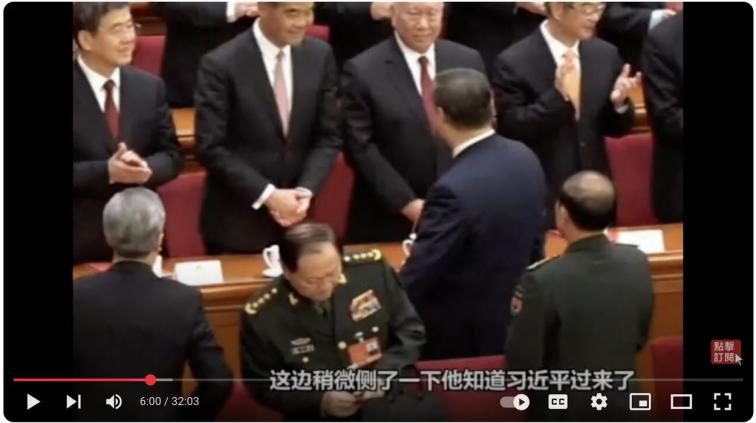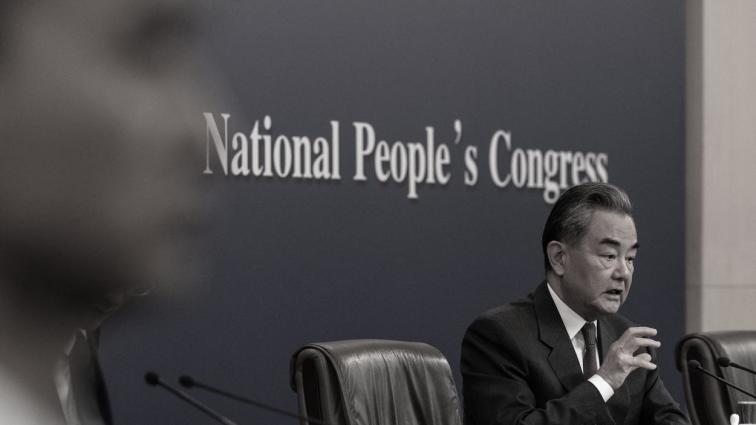The picture shows Cai Qi, a member of the Politburo Standing Committee of the Chinese Communist Party, attending the National People's Congress on March 12, 2023. (Screenshot from the web)
[People News] On September 3, 2025, during the Beijing military parade, Xi Jinping’s conversation with Vladimir Putin on their way to the viewing platform was accidentally broadcast live. The two were overheard excitedly talking about organ transplants, immortality, and living to 150. The incident became an international scandal. The Chinese Communist Party (CCP) has always treated leaders’ health as a state secret. Power struggles surrounding elite healthcare are particularly fierce and deadly—worth examining.
State Media Once Claimed Lin Biao Was a Drug Addict
When the CCP seized power in 1949, a gang of bandits occupied Zhongnanhai and indulged in luxury. Premier Zhou Enlai proposed establishing a Central Healthcare Group to look after the leaders, which later became the Central Healthcare Commission.
Its first head, Fu Liansheng, soon landed in trouble over the leader's healthcare.
According to official CCP media, just before the Korean War in 1950, Lin Biao claimed illness to avoid commanding forces into Korea. Mao Zedong asked Fu to bring in specialists for an exam. Their conclusion: Lin had no serious illness, but was addicted to morphine. Fu promised Lin’s wife Ye Qun to keep it secret from others, but insisted he could not conceal it from Mao. Supposedly, Lin never forgave Fu, sowing future enmity.
During the Cultural Revolution, Fu Liansheng was thrown into Qincheng Prison and died under persecution. Who orchestrated his death remains disputed.
Still, the allegation that Lin was a drug addict has been challenged, with some suggesting—like Lin’s later “defection and crash”—it was just another product of political struggle.
Zhu De’s Death: Family Said Injections Made Him Worse
At the CCP’s 9th Congress in 1969, Lin Biao was designated Mao’s successor. That October, Marshal Zhu De and his wife Kang Keqing were sent out of Beijing, returning only in July 1970.
In 2012, Tongzhou Gongjin, a magazine under the Guangdong CPPCC, published an oral history from Zhao Liping, the wife of Zhu’s only son. She recalled that after returning, the couple were under surveillance in Beijing. Kang suspected their home was bugged.
On June 21, 1976, Zhu De was scheduled to meet Australian Prime Minister Malcolm Fraser. He arrived at the Great Hall of the People on time, but with no foreign guest and no word from the Foreign Ministry, he waited nearly an hour in an air-conditioned lounge. After the meeting, he returned home and soon felt ill.
The CCP formed a special medical team for Zhu. Among them was Liu Xiangping, then Health Minister and wife of Xie Fuzhi, closely tied to Jiang Qing. Zhu’s family said the injections he was given seemed to worsen his condition, yet the team refused to change medication. Zhu died within just over ten days.
Xu Shiyou Refused to Go to the 301 Hospital
Xu Shiyou, one of the CCP’s first generals and former Nanjing Military Region commander, had liver cancer but refused to be treated at Beijing’s elite 301 Military Hospital until his death.
According to the 2007 book Xu Shiyou: A Famous General of a Generation, in March 1985, he was diagnosed in Shanghai with liver cancer. Liu Xuanting, political commissar at 301 and Xu’s former subordinate, suggested he transfer to Beijing.
Xu refused: “I won’t go to Beijing!” When pressed why, he replied cryptically, “The road in Beijing is too narrow.” When told Beijing had broad avenues, he added: “Too many people… I can’t win an argument with them.”
The book says that as to whom Xu Shiyou meant by “they,” Liu Xuanting did not dare ask directly. But Xu Shiyou knew very well in his heart; he just did not spell it out at the time. No matter how his old leaders, comrades-in-arms, and subordinates in Nanjing tried to persuade him, Xu stubbornly remained at No. 8 Zhongshan Mausoleum in Nanjing and refused to take even one step.
By “they,” of course, Xu Shiyou was referring to his mortal enemies in officialdom.
Yang Shangkun Reportedly Killed at 301 Hospital
In 1992, fierce power struggles erupted over leadership arrangements for the CCP’s 14th Congress. Deng Xiaoping and Chen Yun clashed over personnel, and Jiang Zemin’s authority was shaky. The Yang brothers—Yang Shangkun and Yang Baibing—held military power and enjoyed Deng’s trust, making them Jiang’s biggest threat.
Under Jiang’s scheming, aided by the cunning Zeng Qinghong, Deng turned against the Yangs. At the 14th Congress in October 1992, the brothers were stripped of command.
Still, Yang Shangkun retained influence, frequently travelling for “inspections.” Jiang saw him as a constant thorn.
On June 7, 1998, Yang was hospitalised at 301 with a cold. On September 14, at 1:17 a.m., he suddenly died.
Officially, CCP media claimed he was diagnosed with leukaemia after being admitted with a high fever. But popular rumour held that Jiang Zemin and Zeng Qinghong, then head of the Healthcare Commission, had him eliminated. Yang’s family later demanded an investigation into his death.
Rumour: Zhou Yongkang Tried to Poison Xi at 301
Since Xi Jinping took power, 301 Hospital has again been deeply entangled in top-level struggles.
At the 2013 Beidaihe conference, rumours spread that Zhou Yongkang tried to assassinate Xi twice. In one attempt, he allegedly ordered a poisoned injection during Xi’s check-up at 301.
The alleged hitman, Zhou’s guard Tan Hong, was arrested on December 1, 2013. Zhou himself was purged in July 2014.
Ling Jihua May Have Kept Secret Health Files
Ling Jihua, Hu Jintao’s chief of staff, was reassigned in 2012 just before Xi took office. He became head of the United Front Work Department and a vice chairman of the CPPCC.
In December 2014, Ling was purged. In July 2016, he was sentenced to life for bribery, illegally obtaining state secrets, and abuse of power.
His brother, Ling Wancheng, fled to the U.S. Reports suggested he carried vast amounts of classified data, possibly including nuclear command details and Zhongnanhai’s facilities. Some claimed Ling had handed these to the U.S.—though he denied it.
It is also believed Ling Jihua may have secretly kept leaders’ health records, including Xi Jinping’s. If true, that would have been deadly leverage. The matter was quietly dropped, suggesting a deal: Ling was spared from execution, and his brother was restrained from leaking secrets.
Did Cai Qi Kill Li Keqiang?
On October 27, 2023, former Premier Li Keqiang died at Shanghai’s Dongjiao Guesthouse, just seven months after leaving office. Officials claimed he suffered a “sudden heart attack” while swimming. His death sparked widespread scepticism.
Li was seen as a reformist and long rumoured to clash with Xi.
Cai Qi, as director of the CCP’s General Office and concurrently head of the Healthcare Commission, oversaw the travel and health of retired leaders. After Li’s death, online leaks accused Xi’s inner circle of orchestrating an assassination, with Cai at the centre.
Xi’s Life in Cai Qi’s Hands
Rumours about Xi’s health abound: alleged liver tumour surgery, collapse from a stroke, and so on—none confirmed. What is visible is his unsteady gait and constant head tremors.
The current deputy director of the Healthcare Commission, Zeng Yixin, serves mainly Xi. A former director of Sun Yat-sen University’s Cancer Centre, his oncology background has fueled speculation about Xi’s illnesses.
Since Xi took power, three General Office chiefs have also chaired the Healthcare Commission: Li Zhanshu, Ding Xuexiang, and Cai Qi.
An insider revealed that after Li Zhanshu retired, many of his corruption problems came to light, but Xi let him off. Li had once served as head of the Health Care Commission; if he secretly kept records of the health secrets of Party and state leaders, that would have given Xi pause.
Ding Xuexiang, who also served as Director of the General Office of the CCP Central Committee and head of the Health Care Commission, leveraged his knowledge of Xi’s health secrets. When handing over the position to Cai Qi, whom Xi trusted more, Ding was at the same time rewarded with a promotion to the Politburo Standing Committee.
Today, Cai Qi, the grand steward of Zhongnanhai, holds a position that in practice surpasses that of Premier Li Qiang. At Xi’s side, Cai plays roles similar to Zhou Enlai’s role beside Mao Zedong—prime minister, bodyguard, strategist, housekeeper, enforcer, secretary, and even eunuch—all at once. He walks on thin ice, always at risk of becoming the scapegoat for “not being absolutely loyal.”
At the same time, however, Cai Qi can be said to be the most powerful man behind the scenes in the CCP, because he controls the security and health secrets of the top leader, Xi Jinping—effectively holding Xi’s life and death in his hands. This is, in fact, Xi’s deepest fear. And as the political situation develops, the younger Cai Qi may not be without ambitions of seizing power himself.
(Dajiyuan) △











News magazine bootstrap themes!
I like this themes, fast loading and look profesional
Thank you Carlos!
You're welcome!
Please support me with give positive rating!
Yes Sure!